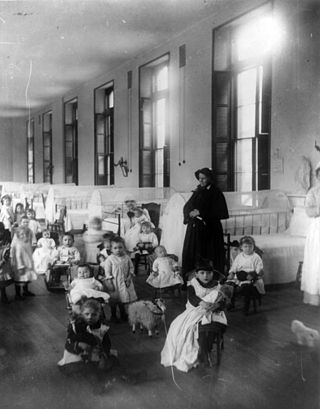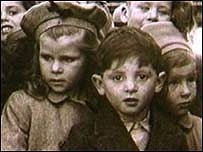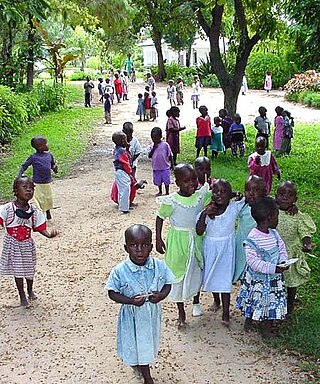
Adoption is a process whereby a person assumes the parenting of another, usually a child, from that person's biological or legal parent or parents. Legal adoptions permanently transfer all rights and responsibilities, along with filiation, from the biological parents to the adoptive parents.

A parent is either the progenitor of a child or, in humans, it can refer to a caregiver or legal guardian. The gametes of a parent result in a child, a male through the sperm, and a female through the ovum. Parents are first-degree relatives and have 50% genetic meet. A female can also become a parent through surrogacy. Some parents may be adoptive parents, who nurture and raise an offspring, but are not biologically related to the child. Orphans without adoptive parents can be raised by their grandparents or other family members.

An orphanage is a residential institution, total institution or group home, devoted to the care of orphans and children who, for various reasons, cannot be cared for by their biological families. The parents may be deceased, absent, or abusive. There may be substance abuse or mental illness in the biological home, or the parent may simply be unwilling to care for the child. The legal responsibility for the support of abandoned children differs from country to country, and within countries. Government-run orphanages have been phased out in most developed countries during the latter half of the 20th century but continue to operate in many other regions internationally. It is now generally accepted that orphanages are detrimental to the emotional wellbeing of children, and government support goes instead towards supporting the family unit.

Foster care is a system in which a minor has been placed into a ward, group home, or private home of a state-certified caregiver, referred to as a "foster parent", or with a family member approved by the state. The placement of a "foster child" is normally arranged through the government or a social service agency. The institution, group home, or foster parent is compensated for expenses unless with a family member.

Child care, otherwise known as day care, is the care and supervision of a child or multiple children at a time, whose ages range from two weeks of age to 18 years. Although most parents spend a significant amount of time caring for their child(ren), child care typically refers to the care provided by caregivers that are not the child's parents. Child care is a broad topic that covers a wide spectrum of professionals, institutions, contexts, activities, and social and cultural conventions. Early child care is an important and often overlooked component of child development.
Same-sex adoption is the adoption of children by same-sex couples. It may take the form of a joint adoption by the couple, or of the adoption by one partner of the other's biological child.

Street children are poor or homeless children who live on the streets of a city, town, or village. Homeless youth are often called street kids, or urchins; the definition of street children is contested, but many practitioners and policymakers use UNICEF's concept of boys and girls, aged under 18 years, for whom "the street" has become home and/or their source of livelihood, and who are inadequately protected or supervised. Street girls are sometimes called gamines, a term that is also used for Colombian street children of either sex.

The Duplessis Orphans were a population of Canadian children wrongly certified as mentally ill by the provincial government of Quebec and confined to psychiatric institutions in the 1940s and 1950s. Many of these children were deliberately miscertified in order to acquire additional subsidies from the federal government. They are named for Maurice Duplessis, who served as Premier of Quebec for five non-consecutive terms between 1936 and 1959. The controversies associated with Duplessis, and particularly the corruption and abuse concerning the Duplessis orphans, have led to the popular historic conception of his term as Premier as La Grande Noirceur by its critics.
A restavek is a child in Haiti who is given away by their parents to work for a host household as a domestic servant because the parents lack the resources required to support the child. The term comes from the French language rester avec, "to stay with". Parents unable to care for children may send them to live with wealthier families, often their own relatives or friends. Often the children are from rural areas, and relatives who host restaveks live in more urban settings. The expectation is that the children will be given food and housing in exchange for doing housework. However, many restaveks live in poverty, may not receive proper education, and are at grave risk for physical, emotional, and sexual abuse.
Islamic views on adoption are generally distinct from practices and customs of adoption in other non-Muslim parts of the world like Western or East Asian societies. Adoption in the western sense of the word is not recognized in Islam.

HIV/AIDS in India is an epidemic. The National AIDS Control Organisation (NACO) estimated that 2.14 million people lived with HIV/AIDS in India in 2017. Despite being home to the world's third-largest population of persons with HIV/AIDS, the AIDS prevalence rate in India is lower than that of many other countries. In 2016, India's AIDS prevalence rate stood at approximately 0.30%—the 80th highest in the world. Treatment of HIV/AIDS is via a combination of antiretroviral drugs and education programs to help people avoid infection.
Child protective services (CPS) is the name of an agency in many states of the United States responsible for providing child protection, which includes responding to reports of child abuse or neglect. Some states use other names, often attempting to reflect more family-centered practices, such as department of children and family services (DCFS). CPS is also sometimes known by the name of department of social services, though these terms more often have a broader meaning.

Keep a Child Alive (KCA) is a nonprofit organization that provides healthcare, housing, and other support services to HIV/AIDS-affected communities in Africa and India. Co-founded by Leigh Blake and Alicia Keys, the organization aims to "realize the end of AIDS for children and families, by combating the physical, social and economic impacts of HIV." Keep a Child Alive organizes the annual fundraiser gala The Black Ball, established in 2004, where celebrities and philanthropists gather to support and raise awareness for the cause. Since the first Black Ball, the organization has raised over $28.7 million for HIV/AIDS treatment.

An orphan is a child whose parents have died, are unknown or have permanently abandoned them. It can also refer to a child who has lost only one parent, as the Hebrew translation, for example, is "fatherless"

An AIDS orphan is a child who became an orphan because one or both parents died from AIDS.
The right to social security is recognized as a human right and establishes the right to social security assistance for those unable to work due to sickness, disability, maternity, employment injury, unemployment or old age. Social security systems provided for by states consist of social insurance programs, which provide earned benefits for workers and their families by employment contributions, and/or social assistance programs which provide non-contributory benefits designed to provide minimum levels of social security to persons unable to access social insurance.
Orphans and vulnerable children is a term used to identify the most at-risk group among young people in contexts such as humanitarian aid and education in developing countries. It often used relating to countries in sub-Saharan Africa with a high number of AIDS orphans.
Social security in Germany is codified on the Sozialgesetzbuch (SGB), or the "Social Code", contains 12 main parts, including the following,
María Rosa Leggol, O.S.F., was a Franciscan religious sister who has been called the "Mother Teresa of Honduras." In the 1960s, she organized a group of homes to care for the abandoned and deprived children of that nation, which became organized as the Sociedad Amigos de los Niños (SAN). Through the organization, she educated over 40,000 orphans across fifty years.
Honduran nationality law is regulated by the Constitution, the Migration and Aliens Act, the 2014 Law on Protection of Honduran Migrants and their Families and relevant treaties to which Honduras is a signatory. These laws determine who is, or is eligible to be, a citizen of Honduras. The legal means to acquire nationality and formal membership in a nation differ from the relationship of rights and obligations between a national and the nation, known as citizenship. Honduran nationality is typically obtained either on the principle of jus soli, i.e. by birth in Honduras; or under the rules of jus sanguinis, i.e. by birth abroad to a parent with Honduran nationality. It can also be granted to a permanent resident who has lived in the country for a given period of time through naturalization.










